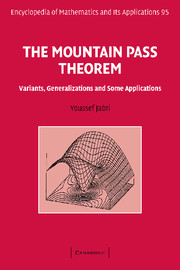Book contents
- Frontmatter
- Contents
- Introduction
- 1 Retrospective
- I First Steps Toward the Mountains
- II Reaching the Mountain Pass Through Easy Climbs
- III A Deeper Insight in Mountains Topology
- IV The Landscape Becoming Less Smooth
- 14 The Semismooth MPT
- 15 The Nonsmooth MPT
- 16 The Metric MPT
- V Speculating about the Mountain Pass Geometry
- VI Technical Climbs
- A Background Material
- Bibliography
- Index
15 - The Nonsmooth MPT
Published online by Cambridge University Press: 04 September 2009
- Frontmatter
- Contents
- Introduction
- 1 Retrospective
- I First Steps Toward the Mountains
- II Reaching the Mountain Pass Through Easy Climbs
- III A Deeper Insight in Mountains Topology
- IV The Landscape Becoming Less Smooth
- 14 The Semismooth MPT
- 15 The Nonsmooth MPT
- 16 The Metric MPT
- V Speculating about the Mountain Pass Geometry
- VI Technical Climbs
- A Background Material
- Bibliography
- Index
Summary
Just as “nonlinear” is understood in mathematics to mean “non necessarily linear,” we intend the term “nonsmooth” to refer to certain situation in which smoothness (differentiability) of the data is not necessarily postulated.
F. Clarke, Optimization and nonsmooth analysis, Wiley, 1983.In the previous chapter we treated continuous convex perturbations of C1-functionals. In this one, we will assume a weakened smoothness assumption on functionals. Namely, we will suppose that our functional is only locally Lipschitz. And we will prove an appropriate MPT for this kind of functionals.
The first and the most famous version of the MPT for locally Lipschitz continuous functionals is due to Chang [202] who proved it by adapting the deformation lemma to this particular situation.
His approach is exactly the one we saw for C1-functionals “minus” the fact that there was no result about the existence of a pseudo-gradient vector field for locally Lipschitz functionals. He succeeds in establishing such a result using the Hahn-Banach theorem and the basic properties of the subdifferential calculus and generalized gradients in the sense of F.H. Clarke. The rest of his procedure then becomes “standard.” The paper [202] of Chang proved to be an invaluable reference when dealing with locally Lipschitz critical point theory.
Information
- Type
- Chapter
- Information
- The Mountain Pass TheoremVariants, Generalizations and Some Applications, pp. 174 - 185Publisher: Cambridge University PressPrint publication year: 2003
